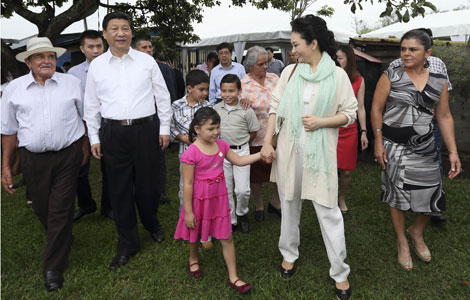Convergence of interests
Updated: 2013-04-01 07:48
By Zheng Bijian (China Daily)
|
||||||||
Trends of the times mean countries should work together to promote cooperation and manage competition
The next decade will be a period of unprecedented opportunities and challenges, both for China and the world. The trends of multi-polarity and economic globalization mean there will be more cooperation and competition among countries. Countries will need to promote cooperation and manage competition.
China's development faces a number of serious challenges in the next decade, such as a shortage of natural resources and environmental constraints on its economic growth; unbalanced economic and social development, including imbalances between investment and consumption and between foreign investments in China and Chinese investments abroad, between urban and rural areas, and between the eastern and western regions; difficult industrial restructuring and insufficient research and development; human resources unable to meet the needs of the employment structure; lagging social governance and increasing social tensions; and natural disasters, both predictable and unpredictable.
To meet these challenges, China must first of all make significant advances in its science, technology and education. Second, China must rebalance the Chinese economy and transform the industrial structure, expanding domestic demand and market demand. Third, China must make great efforts to improve social governance so as to make society more dynamic, orderly, environmentally friendly and therefore more harmonious. Fourth, China should devote more efforts to raising ethical standards and inspiring people to work hard to make the country dynamic, harmonious and stable. And in foreign relations, it must gradually enlarge its convergence of interests with other countries.
China should gradually extend its convergence of interests with its neighbors and surrounding regions and form close-knit communities of interests with various countries and regions in different fields and at different levels.
The peaceful rise of large developing countries is now gaining momentum and the next 10 years will be a crucial period for their development and rise. The international financial crisis has led to a major change in the global structure of productive forces and a new technological and industrial revolution, which is green, low carbon and sustainable, is gaining headway. In the post-financial crisis era, global issues such as climate change, energy security, resources, food security and financial security are becoming more acute and the issue of global governance requires urgent attention. As a result, the economic development patterns of major countries will change significantly, and this will lead to further adjustment in the position of major countries and the relations between their interests.
Most Viewed
Editor's Picks

|

|

|

|

|

|
Today's Top News
Relationship 'relaunched'
Good start expected for summit
Xi, Mexican president discuss bilateral co-op
Cooperation to drive mutual growth
Chinese president arrives in Mexico for state visit
China is victim of hacking attacks
US to be largest trade partner
China joins fight against hacking
US Weekly

|

|
















